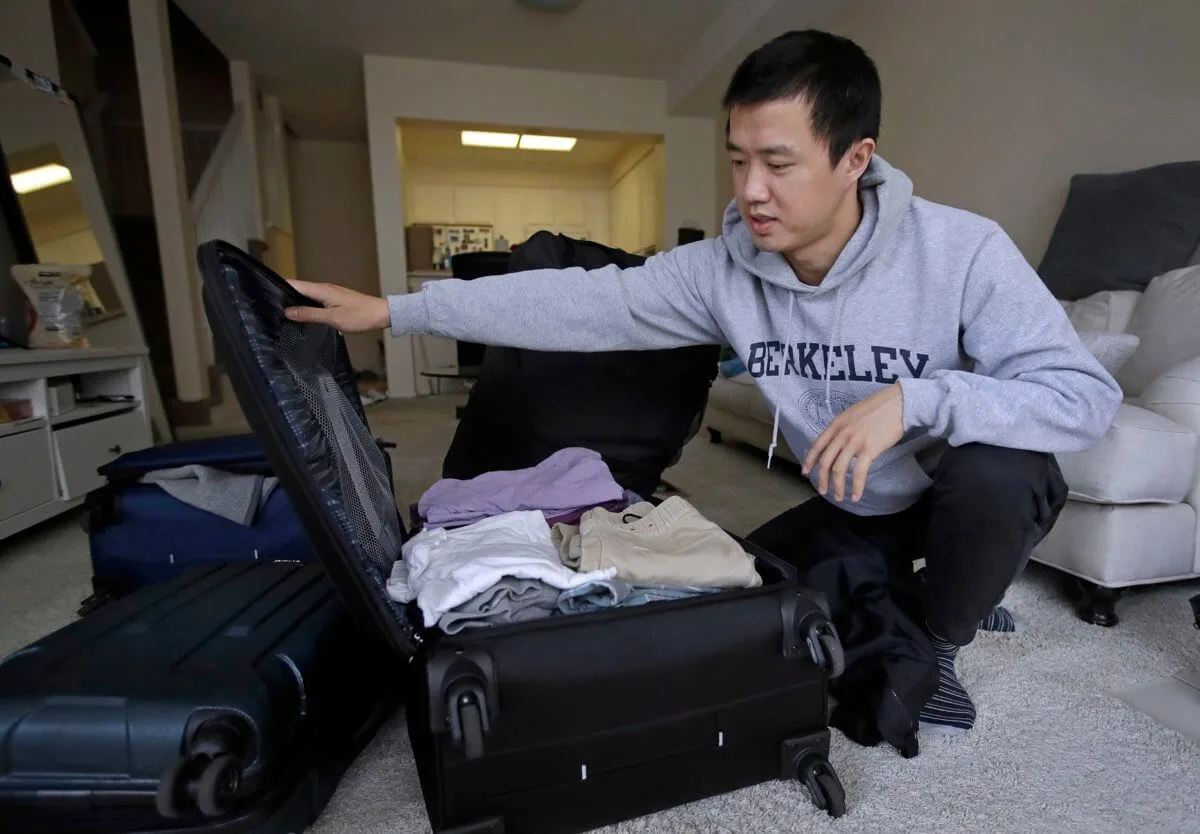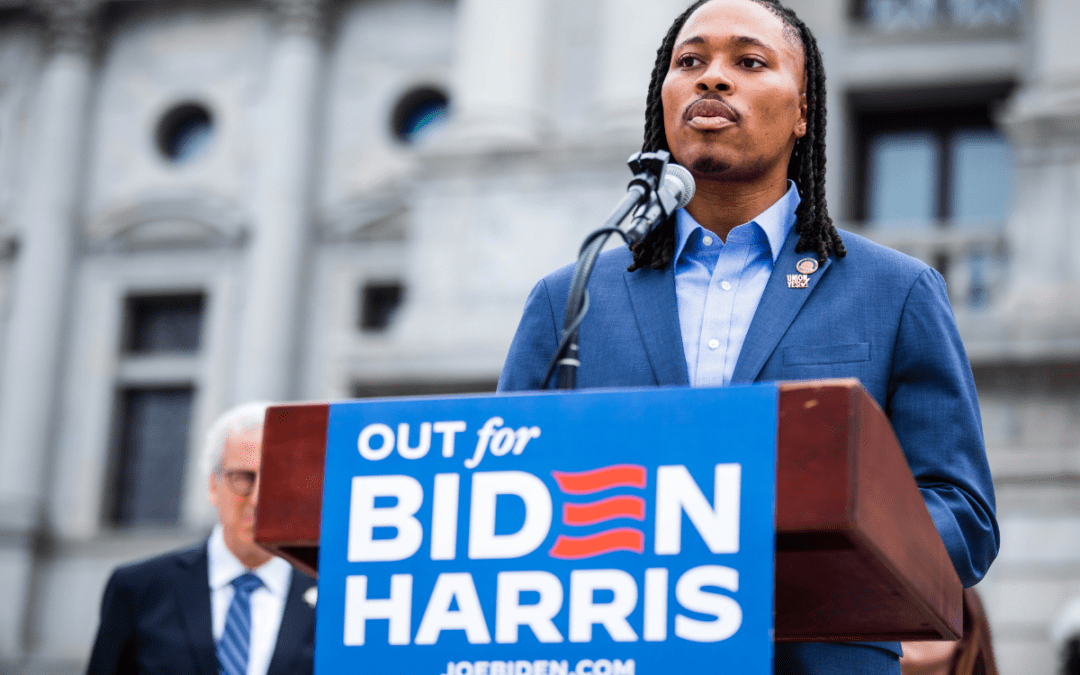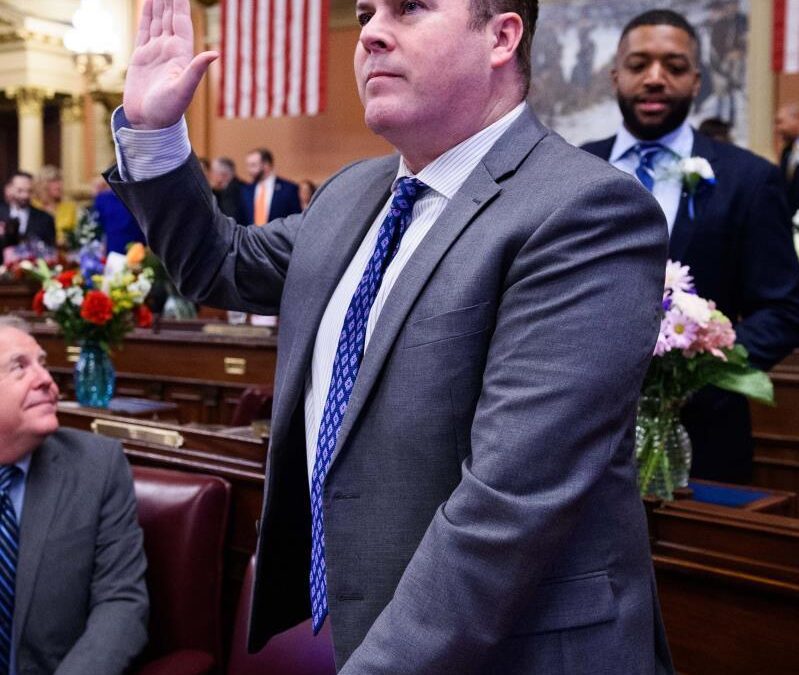
In this Feb. 4, 2019, photo, Leo Wang packs a suitcase at his home in San Jose, Calif. Wang has found himself trapped in an obstacle course regarding H-1B work visas for foreigners. His visa denied and his days in the United States numbered, A federal judge on Thursday, Oct. 1, 2020, temporarily lifted a visa ban on a large number of work permits, undercutting a measure that the Trump administration says will protect American jobs in a pandemic-wracked economy. (AP Photo/Ben Margot, File)
“If we are on a path where we need to create jobs for the American people, we need job creators—and a big chunk of making that happen is allowing immigrants to come to this country.”
An executive order President Donald Trump signed this year to ban temporary work visas for immigrants cost the US economy a lot of money, according to a new working paper from the Brookings Institution. How much money? $100 billion.
In June, at the height of the pandemic, Trump suspended new temporary work visas, which prevented American companies from hiring highly skilled immigrants. The L1 or H1B visas are granted only to highly educated immigrants or immigrants with a specialty occupation, such as doctors, nurses, engineers, and architects.
“I have determined that the entry, through December 31, 2020, of certain aliens as immigrants and nonimmigrants would be detrimental to the interests of the United States,” Trump stated in his executive order, pointing to “the lack of sufficient alternative means to protect unemployed Americans from the threat of competition for scarce jobs from new lawful permanent residents” for his reasoning.
Sorting Fact From Fiction: Sign Up for COURIER’s newsletter.
Although the order was partially, temporarily blocked by a federal judge in early October, the consequences still have had long-lasting effects, including potentially slowing down the recovery of an economy ravaged by the coronavirus pandemic.
According to the study published Tuesday, Trump’s order prohibited almost 200,000 foreign workers from entering the United States. In the following days, the authors write, Fortune 500 companies lost nearly 0.5% of their value. Researchers estimate that to be a $100 billion loss to the economy.
Since the study only focused on Fortune 500 companies, that number could be much higher, Dany Bahr, a senior global economist at Brookings, told COURIER. He co-authored the study with Britta Glennon, a professor at the Wharton School of Business, and Prithwiraj Choudhury, a Harvard Business School professor.
President Trump and his supporters have repeatedly tried to blame immigrants for the country’s economic struggles, including claiming foreigners have displaced American workers and falsely accusing them of lowering wages in the country. “Look at the evidence,” Bahr countered. “The vast majority of evidence in any indicator that you see shows that is not the case. Foreign workers are not taking jobs away from the American people. They’re not lowering their salaries.”
“If we are on a path where we need to create jobs for the American people, we need job creators—and a big chunk of making that happen is allowing immigrants to come to this country,” Bahr added.
Countless studies show that immigration is good for the economy. Most recently, the National Bureau of Economic Research released a study in July that found immigrants are 80% more likely to create jobs than their American counterparts.
RELATED: Trump’s Racist Rhetoric About Suburbs Erases the Immigrants and Refugees Who Live There
Look at Naperville, Illinois, for example. The Chicago suburb is one of the most multicultural in the country, with about 20% of the population being foreign-born residents and an estimated 400,000 undocumented immigrants living there.
Naperville was also ranked the wealthiest city in the Midwest. A big part of that is attributed to the entrepreneurial spirit of immigrants living in the suburb, who own about one-third of businesses there.
Bahr pointed out that Trump’s work visa ban did not guarantee companies would hire American workers. “The evidence shows that when firms can’t hire foreign talent, they rearrange themselves in a way that they get away with it,” the Brookings economist explained. “They either hire personnel abroad or they bring in new technologies that will help them do whatever they have to do.”
He added: “You can’t force firms to hire Americans to stop migration—that’s not happening.”
Since Trump’s work visa ban, the economy has continued to struggle, and with federal aid drying up and big companies laying off workers, nearly 8 million people have slipped into poverty since May.
RELATED: Team Trump Gave His Rich Friends—Not You—A Heads Up On How Bad COVID Would Be
Trump’s immigration crackdown also impacts the nation’s ranking on a global scale. By restricting immigration, the United States is losing its innovative edge—which will be key to building back the economy. “If you look at patterns, for instance, the share of patents produced by foreigners that are first- or second-generation has been increasing dramatically,” Bahr said. “That is what helps companies in Silicon Valley to continue to innovate and be on the top.”
The country has already seen an impact in this regard since Trump took office: A 2017 report found that the US has seen its share of the world’s billion-dollar tech startups drop in recent years, from 75% in 2013 to just 43% in 2016. As one expert told CNBC, that’s because foreign students are returning to their home countries to start businesses instead of staying in the United States.
Banning refugees and immigrants from entering the country also has another, more profound outcome, Bahr said. “The US is going back on its promise that is inscribed on the Statue of Liberty. That not only has an economic impact, it also has a moral impact. It affects how the country is seen and perceived by others, and I think it lessens the US’s moral standard in the world.”
READ MORE: Trump Administration Ramps Up ICE Raids Ahead of the Election
Politics

Malcolm Kenyatta makes history after winning primary for Pa. Auditor General
State Rep. Malcolm Kenyatta, who was first elected to the state House in 2018, won the Democratic nomination for Pa. Auditor General and will...

Biden administration bans noncompete clauses for workers
The Federal Trade Commission (FTC) voted on Tuesday to ban noncompete agreements—those pesky clauses that employers often force their workers to...

Philadelphia DA cancels arrest warrant for state Rep. Kevin Boyle on eve of Pa. primary
Philadelphia District Attorney Larry Krasner said a detective had sought the warrant against Boyle, a Democrat whose district includes a section of...
Local News

What do you know about Wawa? 7 fun facts about Pennsylvania’s beloved convenience store
Wawa has 60 years of Pennsylvania roots, and today the commonwealth’s largest private company has more than 1,000 locations along the east coast....

Conjoined twins from Berks County die at age 62
Conjoined twins Lori and George Schappell, who pursued separate careers, interests and relationships during lives that defied medical expectations,...





